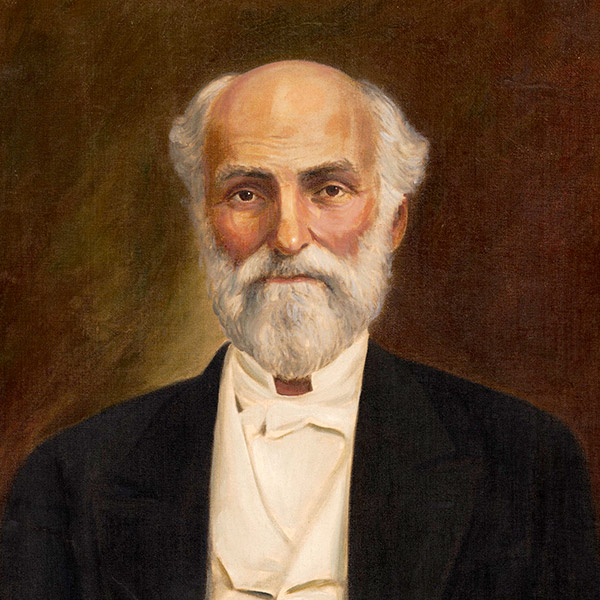Rufus C. Burleson
Baylor President, 1886-1897

There was little choice in the selection of a president of the unified universities, now under the name of Baylor University at Waco, for Rufus Burleson was the only candidate for which any support was evident. The first step he took in leading Baylor to the doorway of the twentieth century was the establishment of a policy of coeducation--a policy that he had vehemently abolished when he took over Baylor at Independence in 1846. He then printed circulars, placed advertisements in papers, and published and distributed the University catalog in which the planned practice of coeducation was prominently announced. Approximately 450 students enrolled for classes in September 1886 -- two-thirds of them male.
To enroll at Baylor an individual had to present testimonials of good moral character to the president. If these were accepted, the applicant was allowed to take the admission examinations. Of course, boys had to be at least fifteen and girls fourteen years old before they could be considered admission candidates. To pass males had to show proficiency in orthography, reading, composition, English, Latin, Greek, higher arithmetic, elementary algebra and ancient and modern geography. Females were not tested on their knowledge of foreign languages or geography, but did have to pass an American history exam. Any student not proficient in these subjects had to enter the preparatory department, the lower division of the University system. Approximately half of those who came to Baylor enrolled in this department. Another division of the University was the Lone Star School of Oratory in which approximately one-fourth of the student body enrolled. Students interested in a business career usually enrolled in the Commercial College.
In May 1893 the trustees approved the addition of a Bible study program to the curriculum. Emphasis was to be on all books of the Bible as well as on doctrine and discipline. The program was to operate under the direction of Rev. B. H. Carroll, pastor of the Waco First Baptist Church and chairman of the trustees. The purpose of the Department of Bible Teaching, as it was named, was the training of ministers, the equipping of students of both sexes for "better service in the Sunday School and other departments of church activity," and the "popularizing of the intelligent study of God's word."
During his administration Burleson also instituted several other academic programs, authorized the formation of literary societies, added several faculty members, and gradually gave students greater latitude in social and athletic activities. He also constructed the first two permanent facilities on the Waco campus, one of them-the girl's dormitory-was named in honor of his wife, Georgia Burleson, and dedicated to female education and piety.
Although Burleson deserves recognition for his leadership as Baylor’s president and for his contributions to the Baptist denomination during the early history of Baptists in the State of Texas, he arguably stands as the most controversial of all of Baylor’s early leaders due to his attitudes and behaviors with regard to slavery and the Confederate Army’s role in the American Civil War. When the Civil War began in 1861, Burleson encouraged nearly 50 Baylor students to volunteer and fight. He enlisted as a private in Colonel Joseph W. Speight’s Fifteenth Texas Infantry Regiment in 1862 and assumed an appointment as chaplain in 1863.
After the Civil War, Burleson was a prominent promoter of the “Lost Cause,” the concept of a divinely white Southern future that honored the memory of antebellum whiteness and Confederate heroes. He once stated that enslaved people should not have been freed until “they were christianized and prepared for citizenship, or to return home to Africa and colonize and christianize ‘the Dark Continent.’ The African race would thereby have been a blessing to both continents.” When Burleson secured a large gift on behalf of the Baptist Home Mission Society to found Bishop College, a Black Baptist college in East Texas, in 1881, he stated the institution would “educate the colored man and get him wise enough and good enough to go back to Africa and civilize the country, for there won’t be room enough for him in this country.”
Eventually, age and "modern ways of doing things" caught up with Burleson who, at the request of the trustees, reluctantly stepped down from the presidency of the University. He felt that, even though he was approaching his seventh-fifth year, he still had much to offer, but he acquiesced to the governing board which gave him the title of President Emeritus.
In his letter of resignation he closed with the statement that "I will therefore accept the position assigned me and give it a fair trial and do all in my power to advance the glory of Baylor University." In spite of the loss of personal prestige, administrative authority and teaching privileges, Burleson kept his promise and worked diligently for Baylor until his death four years later.
